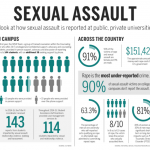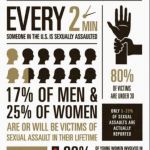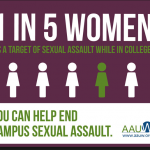By: Justin Janorschke
For many Northwestern Missourians, the story of Daisy Coleman from Maryville hits a little closer to home than most. She’s been the topic of controversy for several years ever since the story of her rape and subsequent investigation was picked up by the media and brought to national attention. She received both support and condemnation from people across the nation, with many people shaming her across social media. The events of her story have been chronicled in a documentary, titled “Audrie and Daisy.”
Western’s Learning Communities decided to use her story as a way to bring awareness to students about social media can shape how people perceive race and gender issues. They not only presented the documentary, but also brought her to campus as part of a panel talking about the realities of sexual assault.
Cole McMillian, one of the Learning Communities coordinators, described where the idea to put on the panel came from.
“With this movie coming out, it kind of tied really well into the social media aspect, as well as the gender aspect and how women deal with sexual assault cases and how those are treated online,” McMillian said. “I had the idea of maybe seeing if we could get her to do a panel because her new organization was going around the country doing panels at universities. It was perfectly relevant to what we had going on.”
Coleman’s organization, SafeBAE, is a “student-focused, survivor-driven campaign whose mission is to raise awareness about sexual assault in middle and high schools and student’s rights under Title IX,” according to their mission statement.
“We like to go to high schools and teach kids about Title IX rights, bystander intervention and what consent is,” Coleman said. “We created a series of educational films where we can educate people on their Title IX rights and you can take these back to your high schools and teach other people about it.”
Dr. Christopher Bond, the director of Learning Communities, pointed out how important it was to be educated on Title IX laws.
“We are fortunate enough to have an actual director of Title IX here [on campus],” Bond said. “It speaks for itself that almost the entire room raised their hand when Daisy asked, ‘do you know what Title IX is?’”
Besides detailing her organization’s goals and purposes, Coleman spoke about topics such as the importance that victims share their stories of survival and how finding a good counselor can help victims express their feelings without judgement.
“Once I found a good counselor it was really good for me to get out all of that bad energy and negativity,” Coleman said. “I think it’s really good to have a counselor; they’re basically just kind of like a friend who is going to sit back and listen to all of your problems. Sometimes they give advice, sometimes they don’t, but I think they are great for whatever you are going through.”
Counselors were on station to provide support for any audience members who might have felt uncomfortable. Law enforcement officers were also present in case anyone wanted to report a crime. Overall, nearly 200 people were in attendance of the documentary and panel.








